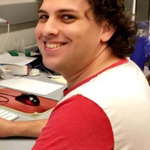Dark matter is believed to make up roughly 80% of the mass in the universe. The SuperCDMS collaboration uses cryogenic silicon and germanium detectors with the goal of detecting dark matter interactions and distinguishing them from background interactions. The experimental reach of SuperCDMS SNOLAB and its future generations depend on the response of the detectors to particle interactions. One important aspect of this response is the ionization yield, the number of electron-hole pairs that are produced as a result of an energy deposition in a detector. The ionization yield depends on the energy deposited, as well as whether the interaction was an electron recoil or a nuclear recoil, the latter of which is characteristic of dark matter. This quantity has not yet been measured for sub-keV recoil energies and, as such, is a parameter of key interest for the SuperCDMS experiment and any other experiments utilizing these targets. This talk will discuss the way in which SuperCDMS sensitivity estimates are determined and how they rely on the ionization yield. This will lead into a discussion on SuperCDMS IMPACT, a neutron scattering experiment that aims to measure the ionization yield in silicon and germanium at sub-keV nuclear recoil energies.
SuperCDMS IMPACT: The Importance and Determination of the Silicon Ionization Yield
This talk will discuss the way in which SuperCDMS sensitivity estimates are determined and how they rely on the ionization yield. This will lead into a discussion on SuperCDMS IMPACT, a neutron scattering experiment that aims to measure the ionization yield in silicon and germanium at sub-keV nuclear recoil energies.
Host: Ziqing Hong


